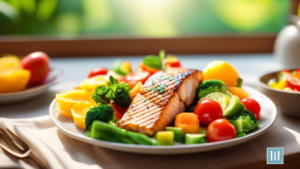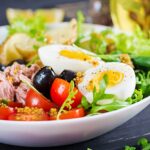If you’re looking to maximize weight loss and improve your overall health, incorporating a high-protein diet into your routine could be the key to reaching your goals. Protein plays a key role in weight loss by boosting metabolism, increasing feelings of fullness, and preserving lean muscle mass.
By focusing on protein-rich foods and strategic meal planning, you can optimize your weight loss journey and see lasting results. When you prioritize protein in your diet, you give your body the building blocks it needs to support your weight loss efforts.
Not only does protein help you feel satisfied and curb cravings, but it also aids in muscle recovery and growth. By choosing lean sources of protein and balancing your meals with a variety of nutrient-dense foods, you can create a sustainable plan that fuels your body and promotes lasting weight loss success.
Key Takeaways
- Incorporating protein-rich foods like chicken breast, Greek yogurt, lentils, tofu, and quinoa can aid in maximizing weight loss.
- Meal planning strategies such as prepping in advance, including variety, balancing plates, and staying hydrated are essential for success on a high-protein diet.
- Monitoring progress by tracking food intake, exercise routine, and weight can help identify patterns, challenges, and areas for improvement to optimize the weight loss journey.
- Enjoying the process and celebrating every step towards a healthier lifestyle is important for long-term success with a high-protein diet.
Understanding the Role of Protein in Weight Loss
By understanding the role of protein in weight loss, you can truly maximize your results with a high-protein diet. Protein plays a key role in weight loss because it helps to boost metabolism, reduce appetite, and preserve muscle mass.
When you consume protein-rich foods, your body burns more calories during digestion compared to fats or carbohydrates. This is known as the thermic effect of food, and it can help increase your overall energy expenditure, leading to more effective weight loss.
Additionally, protein is a satiating nutrient, meaning it helps you feel full and satisfied after meals. By including more protein in your diet, you can reduce cravings and prevent overeating, ultimately leading to a caloric deficit that promotes weight loss. Furthermore, protein is essential for preserving muscle mass during weight loss, ensuring that the weight you lose comes from fat stores rather than muscle tissue.
Benefits of a High Protein Diet
Eating plenty of protein can help you feel full and satisfied throughout the day. This is beneficial for weight loss because it can prevent you from overeating or snacking on unhealthy foods.
Here are some key benefits of incorporating a high-protein diet into your weight loss plan:
- Protein boosts metabolism, helping you burn more calories throughout the day.
- Protein helps maintain muscle mass, which is essential for a healthy metabolism and overall body composition.
- Protein can reduce cravings and feelings of hunger, making it easier for you to stick to your weight loss goals.
By prioritizing protein in your diet, you can enjoy these benefits and maximize your weight loss efforts. Remember, a high protein diet can not only help you shed extra pounds but also support your overall health and well-being.
Protein-Rich Foods to Incorporate
Fuel up on foods bursting with muscle-building power to help you reach your goals. When it comes to incorporating protein-rich foods into your diet, think about including lean sources that not only support your weight loss journey but also keep you feeling satisfied. Here are some delicious options to consider:
| Protein-Rich Foods | Serving Size | Protein Content (g) |
|---|---|---|
| Chicken Breast | 3 oz | 26 |
| Greek Yogurt | 1 cup | 20 |
| Lentils | 1 cup | 18 |
| Tofu | 3 oz | 8 |
| Quinoa | 1 cup | 8 |
These protein-packed foods can be versatile and easily incorporated into your meals, making it easier for you to stick to your weight loss plan. Experiment with different recipes to keep your taste buds excited and your body fueled with the nutrients it needs. Remember, a high protein diet can be delicious and satisfying while helping you achieve your weight loss goals.
Meal Planning Strategies for Success
To achieve optimal results, it’s important to plan your meals strategically for success in your weight loss journey.
Here are four meal planning strategies that will help you maximize your weight loss with a high protein diet:
- Prep in Advance: Take some time each week to plan and prepare your meals. This will help you avoid impulsive food choices and stay on track with your high protein diet.
- Include Variety: Incorporate a variety of protein sources like lean meats, poultry, fish, eggs, dairy, and plant-based options to ensure you’re getting all the essential nutrients your body needs.
- Balance Your Plate: Aim to fill half of your plate with vegetables, a quarter with protein-rich foods, and the remaining quarter with whole grains or healthy fats to create a well-rounded and satisfying meal.
- Stay Hydrated: Drinking plenty of water throughout the day will not only keep you hydrated but also help you feel full and satisfied, reducing the chances of overeating or reaching for unhealthy snacks.
By following these meal planning strategies, you’ll be setting yourself up for success in your weight loss journey while enjoying delicious and nutritious meals that support your high protein diet goals.
Monitoring Progress and Adjusting as Needed
As you keep track of your progress, be prepared to make adjustments as needed to stay on track with your health goals. Monitoring your weight loss journey is essential to ensure you are making progress and staying motivated. By tracking your food intake, exercise routine, and weight regularly, you can identify patterns, challenges, and areas for improvement. Remember, progress is not always linear, so be patient with yourself and celebrate small victories along the way.
| Day | Food Intake | Exercise Routine |
|---|---|---|
| Monday | High protein meals, snacks | 30-minute cardio |
| Tuesday | Balanced meals, protein shake | Strength training |
| Wednesday | Low carb meals, fruit snacks | Yoga session |
| Thursday | Protein-packed breakfast, salad for lunch | Rest day |
| Friday | Cheat meal, protein bar | HIIT workout |
By consistently monitoring your progress and making adjustments as needed, you can optimize your weight loss journey with a high protein diet. Stay committed to your health goals and listen to your body to make the necessary changes for long-term success. Remember, it’s a journey, not a race, so enjoy the process and celebrate every step towards a healthier you.
Frequently Asked Questions
Can a high protein diet cause kidney damage or other health issues?
Eating a high protein diet can lead to kidney damage if not balanced with adequate hydration and other nutrients. It’s crucial to consult a healthcare provider to ensure you’re meeting your body’s needs.
How does the timing of protein consumption affect weight loss results?
When it comes to weight loss, timing protein consumption strategically can boost results. Eating protein-rich meals earlier in the day can help control hunger, increase metabolism, and support muscle growth for optimal fat loss.
Are there any potential risks or side effects associated with consuming too much protein?
Consuming too much protein can strain your kidneys, cause dehydration, and lead to nutrient imbalances. It’s important to find a balance and consult a healthcare professional to prevent any potential risks or side effects.
Is it possible to follow a high protein diet while still meeting all of your nutritional needs?
You can absolutely follow a high protein diet while meeting all your nutritional needs. By including a variety of protein sources, fruits, vegetables, and whole grains, you can ensure you’re getting the essential nutrients your body requires.
Will a high protein diet help with weight loss if I have a slow metabolism?
If you have a slow metabolism, a high protein diet can still help with weight loss. Protein boosts metabolism, reduces appetite, and helps preserve muscle mass. Focus on lean proteins and pair with balanced meals.














